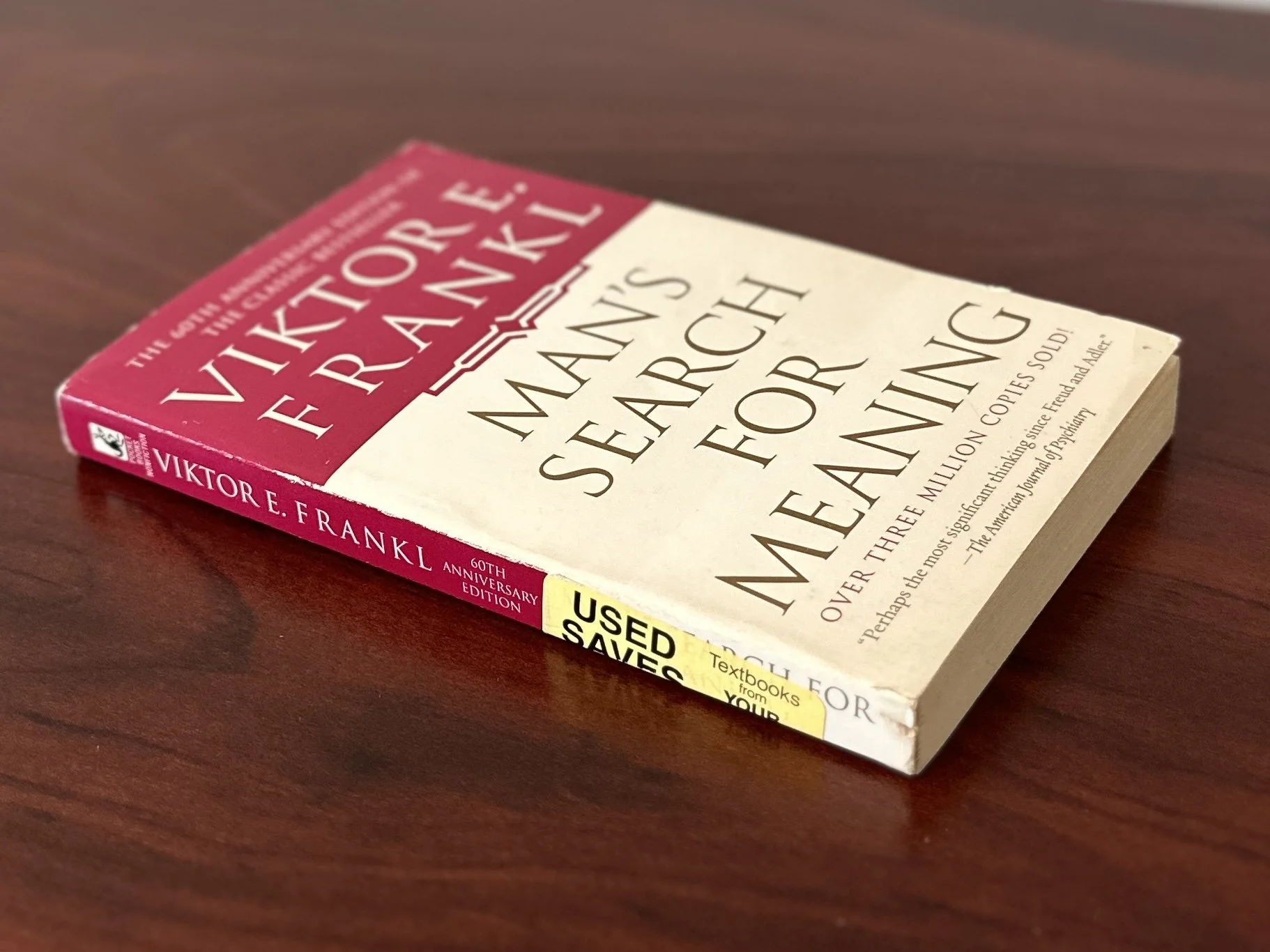Book Review: Man’s Search for Meaning and What It Teaches Us About Mental Health
Viktor Frankl’s Man’s Search for Meaning is a foundational text in psychology and a powerful reflection on how meaning shapes our ability to cope with suffering. It was one of the first books ever recommended to me in my Intro to Psych course during my very first semester of college. My professor included it on a list of readings that, he said, would shape how we understand people. I bought a used copy from the college bookstore—and all these years later, I still have it.
Now, as a therapist, I often return to this book for both personal reflection and clinical insight, as well as recommendations to clients and friends. Its message remains as relevant today as ever: when we can connect to meaning, we can survive—and even grow through—some of life’s hardest experiences.
Why This Book Matters for Mental Health
Man’s Search for Meaning isn’t a self-help book, at least not in the typical sense. It’s part memoir, part philosophy, and part psychological insight. Viktor Frankl, an Austrian psychiatrist and Holocaust survivor, recounts his experience in Nazi concentration camps and reflects on what kept some people emotionally and spiritually alive—even in the most brutal conditions imaginable.
What makes this book so powerful is its central idea:
“Those who have a ‘why’ to live, can bear with almost any ‘how.’”
Frankl observed that meaning—not happiness, not comfort, not achievement—was the driving force that helped people endure unimaginable suffering. And in his post-war life, he developed logotherapy, a form of psychotherapy built around that very concept: helping people find meaning in their lives.
How Frankl’s Message Shows Up in Therapy
As a therapist, I see Frankl’s wisdom play out all the time. Clients come in feeling stuck, overwhelmed, lost. The external situations vary—grief, anxiety, depression, identity struggles, life transitions—but underneath it all is often a quiet question:
“What is the point of all this?”
This book doesn’t offer easy answers, and neither do I. But it helps frame the question differently. Instead of focusing solely on how to avoid pain or fix symptoms, we start to explore what gives life value—even in the midst of pain.
For some clients, that meaning comes from relationships. For others, creativity, faith, nature, service, or simply surviving one more day. Frankl reminds us that suffering itself doesn’t define us—but how we respond to it can.
“When we are no longer able to change a situation, we are challenged to change ourselves.”
It’s one of my favorite quotes, and one I’ve returned to often—both in my own life and in sessions with clients.
Who Should Read This Book?
This book isn’t always an easy read, especially the first half that recounts Frankl’s time in the camps. But it’s surprisingly short, and his writing is clear, thoughtful, and often profound. If you’re in a season of loss, transition, or uncertainty, Man’s Search for Meaning can offer comfort—not by minimizing the pain, but by inviting you to reflect on what matters most.
It’s also a great read for:
Anyone interested in existential or humanistic psychology
Clients navigating identity or purpose work
Those exploring grief, trauma, or post-traumatic growth
People feeling emotionally numb or burned out
I’ve recommended it to clients who were wrestling with chronic illness, life direction, even recovery from burnout. And while not everyone connects with it the same way, many find themselves underlining lines just like someone once did in my old copy.
Therapy and the Search for Meaning
Sometimes, the work we do in therapy echoes Frankl’s own process—examining pain not to wallow in it, but to understand what it reveals about our values, longings, and capacity to adapt. Therapy, at its best, creates a space for clients to reclaim authorship of their stories.
That’s not to say therapy is only about meaning. We also work on coping skills, boundaries, relationships, self-care, and the day-to-day realities of functioning in a complicated world. But purpose? That’s often the thread that pulls things together.
Meaning doesn’t always come with fireworks or big life revelations. Sometimes, it looks like showing up. Saying “this matters.” Choosing life again, even when it’s hard.
Final Thoughts
Man’s Search for Meaning isn’t a substitute for therapy—but it is a reminder that you are not alone in your suffering, and that even in the darkest places, the human spirit can find light.
If the themes in this book resonate with you—loss, identity, resilience, purpose—you don’t have to explore them alone. Therapy offers a safe, collaborative space to unpack these ideas in a way that’s personal and practical.
And if your search for meaning feels heavy right now, that’s okay. It’s a journey. And you deserve support along the way.
Curious about starting therapy or want to talk about what gives your life meaning, even in hard seasons? Reach out to schedule a session. I’d be honored to walk with you.
My original used copy of Man’s Search for Meaning



